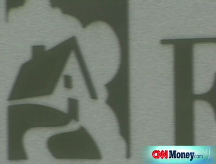The next wave of mortgage defaults
More borrowers with good credit are defaulting on their home loans, and that's going to make it even harder for the staggering housing market to recover.
| 30 yr fixed | 3.80% |
| 15 yr fixed | 3.20% |
| 5/1 ARM | 3.84% |
| 30 yr refi | 3.82% |
| 15 yr refi | 3.20% |
NEW YORK (CNNMoney.com ) -- Prime mortgages are starting to default at disturbingly high rates - a development that threatens to slow any potential housing recovery.
The delinquency rate for prime mortgages worth less than $417,000 was 2.44% in May, compared with 1.38% a year earlier, according to LoanPerformance, a unit of First American (FAF, Fortune 500) CoreLogic that compiles and analyzes residential mortgage statistics.
Delinquencies jumped even more for prime loans of more than $417,000, so-called jumbo loans. They rose to 4.03% of outstanding loans in May, compared with 1.11% a year earlier.
And prime loans issued in 2007 are performing the worst of all, failing at a rate nearly triple that of prime loans issued in 2006, according to LoanPerformance.
"The extent of how bad these loans are doing is very troubling," said Pat Newport, real estate economist with Global Insight, a forecasting firm.
Washington Mutual (WM, Fortune 500) CEO Kerry Killinger said last month that the bank's prime loan delinquencies are on the rise. As of June 30, 2.19% of the prime loans issued by WaMu in 2007 were already delinquent, compared with 1.40% of prime loans issued in 2005.
Also last month, JP Morgan Chase (JPM, Fortune 500) CEO Jaime Dimon called prime mortgage performance "terrible" and suggested that losses connected to prime may triple. For the second quarter, the bank reported net charges of $104 million for prime rate delinquencies, more than double the $50 million recorded three months earlier.
Prime loans are just the latest class of mortgages to suffer a spike in failure rates. The first lot to go bad was, of course, subprime mortgages, whose problems set the housing meltdown in motion. Next were the Alt-A loans, a class between prime and subprime loans that doesn't require strict documentation of a borrower's assets or income.
Now, as prime loans are added to the mix, the resulting foreclosures could haunt the housing market for a long time, according to Global Insight's Patrick Newport.
"Home prices will drop for quite a while - maybe several years," he said.
Prices are already off nearly 20% from their 2006 highs, according to the S&P/Case-Shiller Home Price index.
And there's a strong inverse correlation between home prices and defaults, according to Lawrence Yun, chief economist for the National Association of Realtors.
"It's a feedback loop," he said. "Price declines lead to more defaults, which leads to more price declines."
More foreclosures will add to an already massive oversupply of homes on the market. Inventories are up to about 11 month's worth of sales at the current rate.
Indeed, about 2.8% of all homes for sale were vacant as of June 30, according to Census Bureau statistics. That's up about 50% from three years ago, and near historic highs.
The failure of prime mortgages will also make it more difficult for new borrowers to find affordable loans - and that will slow sales even more. Lending standards have been tightening for months, but if prime loans start to look risky, lenders will be even more conservative about who gets a mortgage.
About 60% of the loan officers surveyed reported that they tightened lending standards for prime mortgages during the first three months of 2008, according to the April 2008 Senior Loan Officer Opinion Survey on Bank Lending Practices from the Federal Reserve, which is released quarterly.
That number will likely be even higher for the second quarter, according to Mike Larson, a real estate analyst for Weiss Research. "It's already harder and more expensive to get loans," he said. "Lenders pull in their horns when things go south."
While easy credit fueled the housing boom, restricted credit is certainly contributing to the bust.
"Eventually," said Newport, "time will break the cycle. Pricing will drop enough to attract more buyers, and inventories will decline."
But there will probably more hard times ahead before markets come back into balance and recovery begins. ![]()




